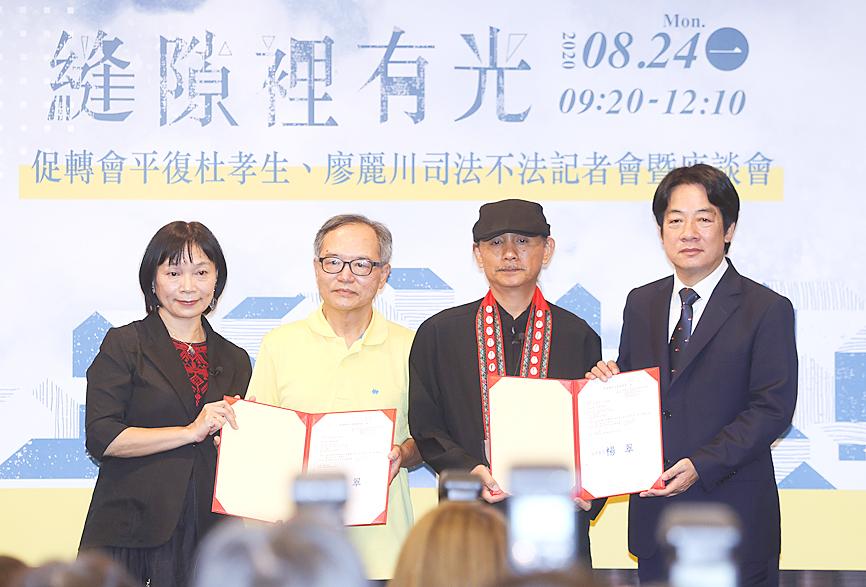The Transitional Justice Commission yesterday exonerated Voyue Tosku (杜孝生) and Liao Li-chuan (廖麗川) — two victims of political persecution during the White Terror era — at a ceremony at the Executive Yuan.
Voyue — a Tsou man who received a 17-year prison sentence in 1954 for corruption — was accused of involvement with Aboriginal leaders who were fighting for self-rule for Aborigines.
At yesterday’s ceremony, which was attended by Vice President William Lai (賴清德), Voyue’s son, Voyu Tosku (杜銘哲), said that while the number of people who lived through the White Terror era is dwindling, their voices would carry on.
Voyu thanked the public for bringing his father’s case to a conclusion after more than 70 years.
Today’s democracy is the result of the shared experience of Taiwanese who lived through the White Terror era, he said.
Following his father’s release after four years in prison, the family was forced to relocate to Chiayi County’s Dapu Township (大埔), where they were the only Aboriginal family, Voyu said.
The move cut them off completely from the Tsou community, he said, adding that his father’s exoneration meant that his story could be told in their family’s hometown in Alishan.
Having lived outside of Alishan for more than 60 years, Voyu said he would probably not move back there, but expressed the hope that Taiwan would become a culturally diverse nation that celebrates its Aborigines.
In 1954, Voyue, who was then the head of the public health department in Alishan Township (阿里山), then called Wufeng Township (吳鳳), and Liao, head of the township office, became embroiled in a corruption case involving Tsou leaders Uyongu Yatauyanguna (湯守仁) and Uyongu’e Yatauyungana (高一生).
Voyue’s and Liao’s families were unable to seek redress and compensation through the Compensation Foundation for Improper Verdicts (財團法人戒嚴時期不當叛亂暨匪諜審判案件補償基金會), as their cases did not involve charges related to civil strife or foreign aggression, the commission said.
However, in response to requests from the two men’s sons, the commission launched an investigation into their cases and found evidence of judicial malpractice, and repealed the charges in accordance with the Act on Promoting Transitional Justice (促進轉型正義條例), it said.
The men’s trials were part of the authorities’ efforts during the White Terror era to exercise control over Alishan Township and its residents, and were a violation of their constitutional rights and freedoms, it said.
The now-defunct Taiwan Garrison Command’s interference in the cases was also a violation of the principle of a fair trial, it added.
Source: Taipei Times - 2020/08/25





















